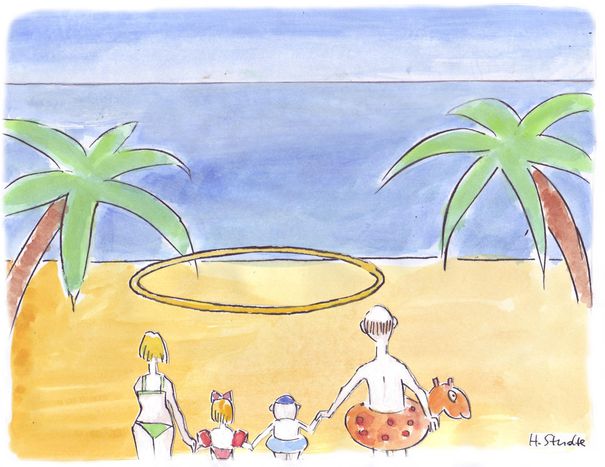
Holy summer of '63
Published on
Translation by:
 Sarah Meleleu
Sarah Meleleu
Be it the word for ‘dead leaves’ in German, holiness or simple Latin - how European use of the word 'holiday' has evolved
‘We’re all going on a summer holiday  …’ Most Britons will recognise these lyrics from Cliff Richard’s number one hit single, despite the fact that it came out in 1963. It just goes to show that we are all ‘ready to get away from it all’, as the German expression ‘reif für die Insel’ ('mature for the island') denotes.
…’ Most Britons will recognise these lyrics from Cliff Richard’s number one hit single, despite the fact that it came out in 1963. It just goes to show that we are all ‘ready to get away from it all’, as the German expression ‘reif für die Insel’ ('mature for the island') denotes.
The German word Urlaub  for example does not conjure up pictures of a peaceful walk through ancient leafy woods, as the word ‘laub’, meaning ‘dead leaves’ would have you believe. It expresses the simple fact that one should ask their superior’s permission before their planned time off work. In fact, in the ninth century the Urlaub was still called ‘urlub’ – a very similar word linguistically to ‘Erlauben’ ('to permit').
for example does not conjure up pictures of a peaceful walk through ancient leafy woods, as the word ‘laub’, meaning ‘dead leaves’ would have you believe. It expresses the simple fact that one should ask their superior’s permission before their planned time off work. In fact, in the ninth century the Urlaub was still called ‘urlub’ – a very similar word linguistically to ‘Erlauben’ ('to permit').
Once the articulate globetrotter has reached the south he comes across a flood of words stemming from Latin: vacances  (France), vacaciones
(France), vacaciones  (Spain), vacanze
(Spain), vacanze  (Italy) or vakantie (Holland). In contrast to the linguistic tradition of the subservient German, his superior has probably already taken to his heels himself here, as the Latin ‘vacans’ does not mean any more than ‘to have free time, not to be busy’. The Spaniard likes it somewhat more extensive: he ‘summers’ (veranear
(Italy) or vakantie (Holland). In contrast to the linguistic tradition of the subservient German, his superior has probably already taken to his heels himself here, as the Latin ‘vacans’ does not mean any more than ‘to have free time, not to be busy’. The Spaniard likes it somewhat more extensive: he ‘summers’ (veranear  ).
).
Italians and Germans will gladly speak of the holidays (Ferien  , Ferie
, Ferie  ). The Latin scholars were also at work there, as the perfect mix of ‘festus’ (‘festive’) and ‘anum’ (‘shrine’) results in the longingly awaited recovery phase, in which original religious traditions would be uprightly preserved and shops would be closed. Even today important public festivals are labelled ‘Feria’ in Spain and the south of France. We even celebrated religious festivals in the fourteenth century (‘holy day’), where today we have become lazy with ‘holiday’. One thing is certain: on ‘sweet idleness’
). The Latin scholars were also at work there, as the perfect mix of ‘festus’ (‘festive’) and ‘anum’ (‘shrine’) results in the longingly awaited recovery phase, in which original religious traditions would be uprightly preserved and shops would be closed. Even today important public festivals are labelled ‘Feria’ in Spain and the south of France. We even celebrated religious festivals in the fourteenth century (‘holy day’), where today we have become lazy with ‘holiday’. One thing is certain: on ‘sweet idleness’  (‘das süße Nichtstun
(‘das süße Nichtstun  , se la couler douce
, se la couler douce  , il dolce far niente’
, il dolce far niente’  ) all Europeans have themselves adapted linguistically.
) all Europeans have themselves adapted linguistically.
This article was first published on cafebabel.com on 2 July 2008
Translated from Europa heilig Urlaubland


